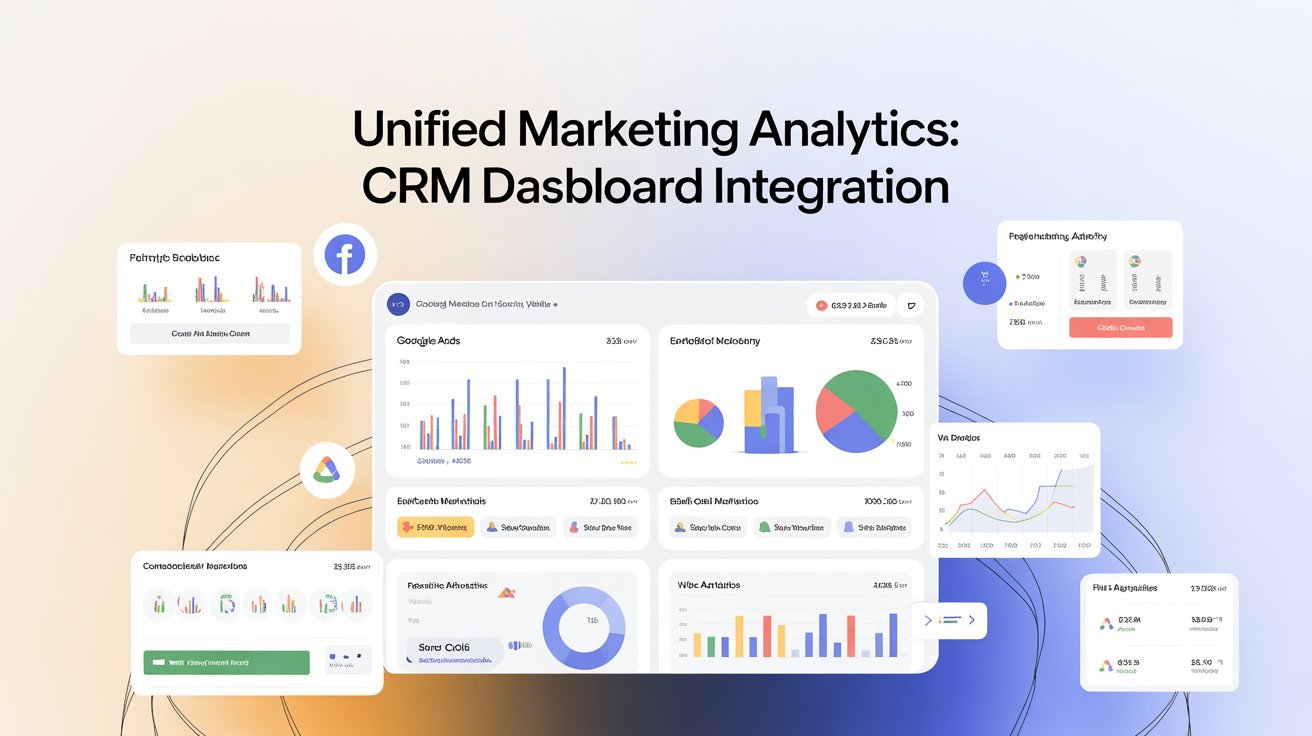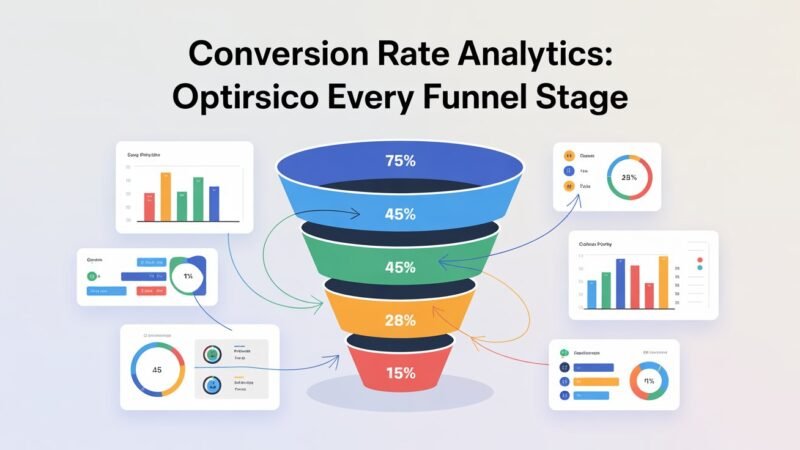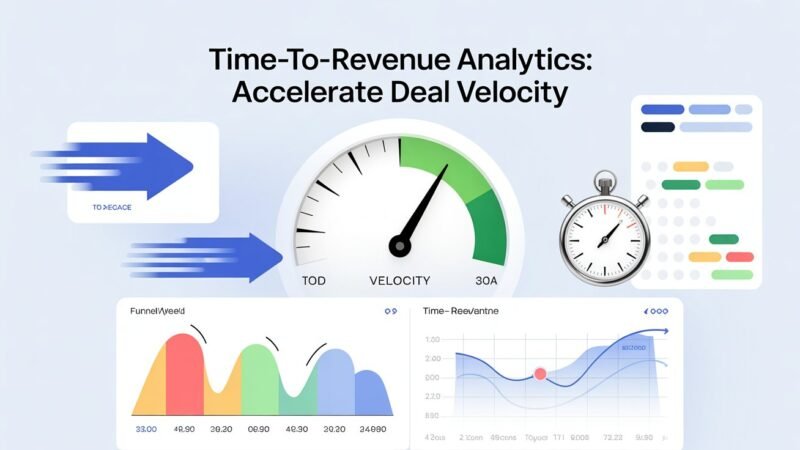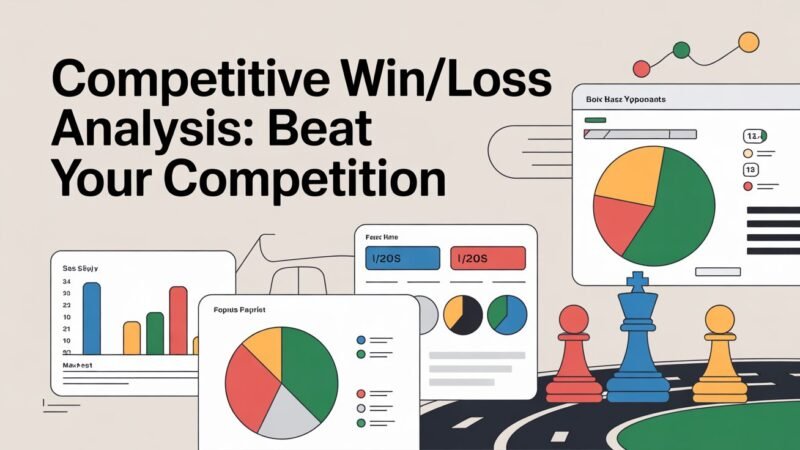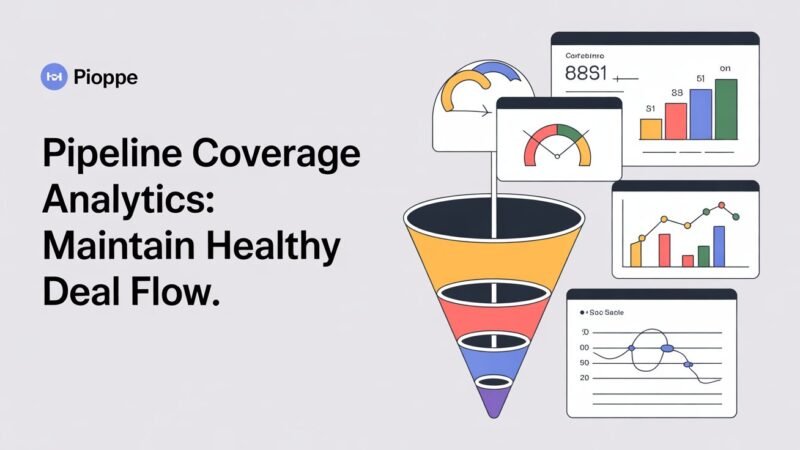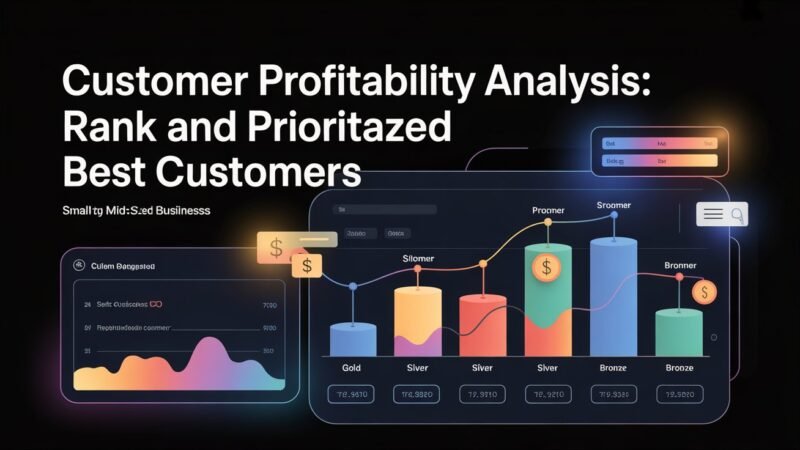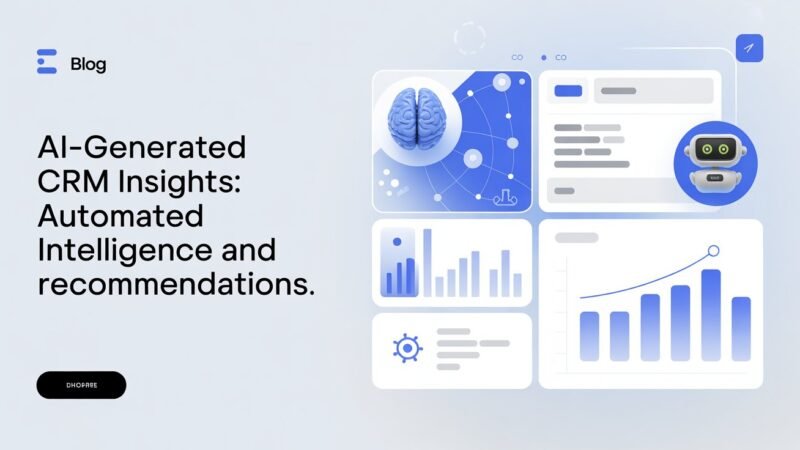Unified marketing analytics through CRM dashboard integration helps you streamline data management and enhance customer insights. With a unified view, you can refine your marketing strategies, target your audience better, and track performance in real time. This integration lets you visualize key metrics, making decision-making easier and more efficient. By understanding customer behavior and preferences, you can boost engagement with personalized messaging. There’s so much more to uncover about optimizing your marketing efforts effectively.
Table of Contents
Key Takeaways
- Unified marketing analytics through CRM dashboard integration centralizes insights, enhancing data visibility across all marketing channels for informed decision-making.
- A CRM dashboard acts as a command center, providing real-time updates and key metrics tailored to business needs for effective performance monitoring.
- Integration streamlines data collection, ensuring synchronization and quality across sources, while automating analytics for efficient reporting and insights.
- Enhanced customer insights through segmentation and behavior analysis allow for targeted marketing strategies that improve engagement and drive better results.
- Overcoming integration challenges requires ensuring technology compatibility, user training, and gaining stakeholder buy-in to facilitate seamless data flow.
Understanding Unified Marketing Analytics
Unified marketing analytics transforms how businesses understand their marketing efforts. By leveraging data consolidation techniques, you can combine insights from various marketing channels into a single, coherent view.
This integration allows you to see how different campaigns perform and identify which strategies drive the most engagement. When your analytics software compatibility is exceptional, it guarantees seamless data flow across platforms, simplifying your analysis process.
You’ll discover trends and patterns that might’ve gone unnoticed in isolated datasets. This clarity enables you to make informed decisions, optimizing your marketing strategies for better results.
With unified analytics, you gain a powerful tool for measuring success and adapting quickly to market changes, enhancing your overall marketing effectiveness. Additionally, utilizing search functionality can greatly improve your ability to find specific insights across your integrated data sources.
The Importance of CRM in Marketing
Understanding the importance of CRM in marketing can transform how you manage your data and target your audience.
With streamlined data management, you can easily access customer insights to refine your strategies.
This enhanced targeting helps you connect with the right customers more effectively, boosting your marketing efforts. Additionally, leveraging software solutions can empower your team to automate processes and make data-driven decisions.
Streamlined Data Management
Effective data management is essential for any marketing strategy, and a robust CRM system plays a pivotal role in achieving this.
With a well-integrated CRM, you can guarantee data synchronization across all platforms, allowing you to maintain a single source of truth. This not only streamlines your processes but also enhances analytics accuracy, giving you clearer insights into customer behaviors and preferences.
When your data is organized and accessible, you can quickly respond to market trends and make informed decisions. You’ll find it easier to track customer interactions, analyze campaign performance, and adjust your strategies accordingly.
Ultimately, a strong CRM foundation empowers you to harness your data effectively, driving your marketing success forward.
Enhanced Targeting Strategies
How can you sharpen your marketing efforts and reach the right audience? By leveraging CRM tools, you can enhance your targeting strategies through effective audience segmentation and campaign optimization.
Here are three key benefits:
- Personalized Messaging: Tailor your messages to specific segments, increasing engagement and conversion rates.
- Data-Driven Insights: Use CRM analytics to understand customer behavior, allowing you to refine your strategies based on real-time data.
- Efficient Resource Allocation: Focus your marketing budget on high-performing segments, ensuring maximum ROI.
Embracing these strategies not only improves your outreach but also empowers you to connect with your audience on a deeper level, driving more successful marketing campaigns.
Start optimizing your approach today!
Key Components of a CRM Dashboard
A well-designed CRM dashboard acts as your command center, providing essential insights at a glance. It features key metrics tailored to your business needs, allowing you to monitor performance indicators effectively.
The user interface should be intuitive, ensuring easy navigation through data sources. With robust data integration, you can pull information from various platforms seamlessly.
Utilize reporting tools and visualization tools to transform complex data into digestible formats. Customization options let you personalize the dashboard according to your priorities.
Furthermore, real-time updates keep you informed about user engagement, enabling prompt decision-making. Ultimately, a well-structured CRM dashboard equips you with the insights necessary to drive growth and enhance customer relationships. Additionally, consider implementing automation tools to enhance efficiency and streamline your workflow.
Benefits of CRM Dashboard Integration
Integrating a CRM dashboard offers you enhanced data visualization, making it easier to interpret and act on important metrics. This clarity helps you streamline your marketing strategies, allowing for more targeted campaigns. You’ll find that improved insights can lead to better decision-making and increased efficiency across your team. Moreover, leveraging performance tracking can provide you with actionable insights that drive your marketing efforts forward.
Enhanced Data Visualization
When it comes to managing customer relationships, enhanced data visualization through CRM dashboard integration can transform the way you interpret and act on your data.
By utilizing visual metrics, you can turn complex data sets into compelling data storytelling that drives decisions.
Here are a few benefits you’ll experience:
- Immediate Insights: Visual representations allow you to quickly grasp trends and patterns.
- Improved Communication: Share dashboards with your team to foster collaboration and alignment on goals.
- Informed Decisions: Leverage real-time data to make adjustments and optimize marketing strategies.
With these enhancements, you can streamline your approach to customer relationship management and guarantee that every action is backed by clear, visual data.
Embrace this transformation for better outcomes!
Streamlined Marketing Strategies
By leveraging CRM dashboard integration, you can simplify your marketing strategies and enhance efficiency. This integration allows you to access real-time data and insights, helping you understand your customer journey better.
With the right analytics tools, you can track customer interactions across various channels, ensuring your marketing efforts are targeted and effective. You’ll be able to identify trends, measure campaign performance, and optimize your strategies based on actionable data.
This streamlined approach not only saves you time but also helps you allocate resources more effectively. As a result, you can focus on what works best for your customers, ultimately driving engagement and increasing conversion rates.
Embrace CRM dashboard integration, and watch your marketing strategies transform.
Streamlining Data Collection and Analysis
Streamlining data collection and analysis is essential for maximizing the effectiveness of your CRM dashboard. By enhancing collection efficiency, you can guarantee that your data is accurate and actionable.
Consider implementing the following strategies:
- Data synchronization: Keep all your data sources aligned for improved data quality.
- Analytics automation: Utilize tools that automate reporting and insights generation, saving you time and effort.
- Integration frameworks: Choose frameworks that facilitate seamless connections between your CRM and other systems.
Adopting these techniques won’t only enhance your reporting tools but also allow for better metric standardization. Additionally, ensuring that your data is protected and compliant with privacy policies can enhance user trust in your analytics processes.
With predictive analytics, you can gain valuable insights to drive your strategies forward, ensuring you’re always making informed decisions.
Enhancing Customer Insights and Segmentation
To truly understand your customers, enhancing insights and segmentation is essential for effective CRM dashboard usage.
By analyzing customer behavior through demographic analysis, you can identify key trends and tailor your segmentation strategies.
Leverage data-driven insights to develop detailed customer personas that reflect engagement patterns and preferences.
Predictive modeling can help you anticipate future behaviors, allowing for proactive marketing approaches.
Focus on audience profiling and preference tracking to refine your market segmentation, ensuring you reach the right customers with the right message.
This strategic approach not only improves your marketing efforts but also fosters deeper connections with your audience, ultimately driving better results.
Embrace these techniques to optimize your CRM dashboard’s potential and enhance customer interactions.
Real-Time Performance Tracking
While you analyze customer insights, real-time performance tracking becomes essential for fine-tuning your strategies.
With the ability to access real-time metrics, you can make informed decisions that enhance your marketing efforts. Instant feedback allows you to quickly adapt to changing customer behaviors and preferences.
Consider these key benefits of real-time performance tracking:
- Immediate insights: Gain a clear understanding of how your campaigns are performing right now.
- Proactive adjustments: Identify underperforming areas and implement changes without delay.
- Enhanced collaboration: Share real-time data across teams to guarantee everyone is aligned with performance goals.
Improving Marketing Campaign Effectiveness
Improving marketing campaign effectiveness hinges on your ability to analyze data and adapt strategies quickly. To achieve this, you should employ campaign optimization techniques that allow you to fine-tune your messaging and targeting in real time.
Start by utilizing audience segmentation methods to identify specific groups within your target market. This way, you can tailor your campaigns to resonate more deeply with each segment.
Regularly reviewing performance metrics will enable you to spot trends and adjust your approach as needed. Testing different elements, like subject lines or visuals, can also lead to better engagement rates.
Personalized Customer Engagement Strategies
To truly engage your customers, you need to harness targeted messaging techniques that resonate with their specific needs.
By leveraging behavioral data insights, you can tailor your communications for maximum impact.
This approach not only enhances customer satisfaction but also fosters loyalty and drives conversions.
Targeted Messaging Techniques
Targeted messaging techniques are essential for creating personalized customer engagement strategies that resonate with your audience.
By focusing on message personalization, you can enhance content relevance and guarantee that your communications align with your target audience’s needs.
Here are three techniques to boost your efforts:
- Demographic targeting: Tailor messages based on age, gender, or location to increase relevance.
- Engagement timing: Send messages when your audience is most receptive, improving response rates.
- Channel selection: Choose the right platforms—email, social media, or SMS—to reach your customers effectively.
Behavioral Data Insights
Understanding customer behavior is essential for crafting tailored engagement strategies that truly resonate. By analyzing behavioral patterns, you can gain valuable insights into what drives your customers’ decisions. This knowledge allows you to implement effective data segmentation, ensuring your marketing efforts are targeted and relevant.
For instance, if you notice a group of customers frequently purchasing certain products, you can create personalized campaigns that highlight similar items or offer exclusive deals.
Using these insights, you can enhance customer experience, boost retention, and drive sales. Remember, the more accurately you understand your audience’s behaviors, the better you can tailor your messaging and engagement strategies.
Embrace behavioral data insights to foster deeper connections and elevate your brand’s impact.
Case Studies: Successful CRM Dashboard Implementations
As businesses increasingly rely on data-driven decisions, several organizations have successfully integrated CRM dashboards to enhance their operations.
Through case study analysis, these companies have demonstrated notable dashboard success, leading to improved productivity and customer satisfaction.
Here are three examples of successful CRM dashboard implementations:
- Retail Chain: Leveraged real-time data analytics to optimize inventory management, resulting in a 20% reduction in stockouts.
- Financial Services Firm: Used dashboards to streamline client communication, increasing retention rates by 15%.
- Healthcare Provider: Integrated patient data dashboards, enhancing care coordination and reducing appointment no-shows by 30%.
These case studies highlight how effective dashboard integration can drive meaningful outcomes, helping you understand the potential of CRM dashboards in your organization.
Challenges and Solutions in Integration
While integrating a CRM dashboard can greatly enhance your business operations, it’s not without its challenges. You might face data silos that hinder a seamless flow of information, creating integration hurdles.
Ensuring technology compatibility is vital, as incompatible systems can derail your progress. Allocate resources wisely for user training to empower your team, and address data quality to maintain trust in your analytics.
Gaining stakeholder buy-in is essential, as their support can streamline decision-making. Don’t overlook timeline management; a well-structured timeline can help you avoid delays.
Finally, prioritize system scalability and plan for ongoing support to adapt to future needs. By tackling these challenges head-on, you’ll pave the way for successful CRM dashboard integration.
Future Trends in Unified Marketing Analytics
With the rapid evolution of technology, unified marketing analytics is set to transform how businesses measure and optimize their marketing efforts.
You’ll see significant advancements in several areas:
- Predictive analytics will enhance decision-making by forecasting trends based on historical data.
- AI integration and machine learning will automate processes, allowing for improved real-time analytics and advanced segmentation.
- Enhanced cross-channel tracking will provide a holistic view of the customer journey, ensuring better user experience while maintaining data privacy.
As automation trends continue to grow, expect a shift towards personalized marketing strategies that resonate with individual consumers.
Frequently Asked Questions
How Much Does CRM Dashboard Integration Typically Cost?
CRM dashboard integration typically costs between $5,000 and $50,000. Cost factors include complexity, customization, and vendor pricing models. You’ll want to assess your specific needs to get an accurate quote for your situation.
What Is the Average Implementation Time for CRM Dashboard Integration?
The average implementation time for CRM dashboard integration is about three to six months. You’ll navigate various implementation phases and face integration challenges, but thorough planning can streamline the process and minimize delays.
Can Small Businesses Benefit From Unified Marketing Analytics?
Small businesses can thrive with unified marketing analytics. By leveraging data-driven decisions, you’ll enhance your marketing effectiveness, turning insights into actions that propel growth. Isn’t it time to reveal your business’s full potential?
What Tools Are Commonly Used for CRM Dashboard Integration?
You’ll commonly use data visualization tools like Tableau or Power BI for CRM dashboard integration. Additionally, explore various API integration options to connect your CRM seamlessly with other platforms, enhancing your overall data analysis and insights.
How to Ensure Data Security During CRM Integration?
Did you know that 60% of data breaches occur during integration? To guarantee data security, you should implement robust data encryption and tightly control user access, keeping sensitive information safe throughout the CRM integration process.
Conclusion
In the ever-evolving landscape of marketing, integrating a CRM dashboard is like finding a compass in a dense forest—it guides your strategy and sharpens your focus. By unifying your marketing analytics, you’re not just collecting data; you’re weaving a narrative that resonates with your customers. Embrace this powerful tool, and watch as personalized engagement transforms your campaigns from ordinary to extraordinary. The future of your marketing success is bright, and it starts with a single integration.

